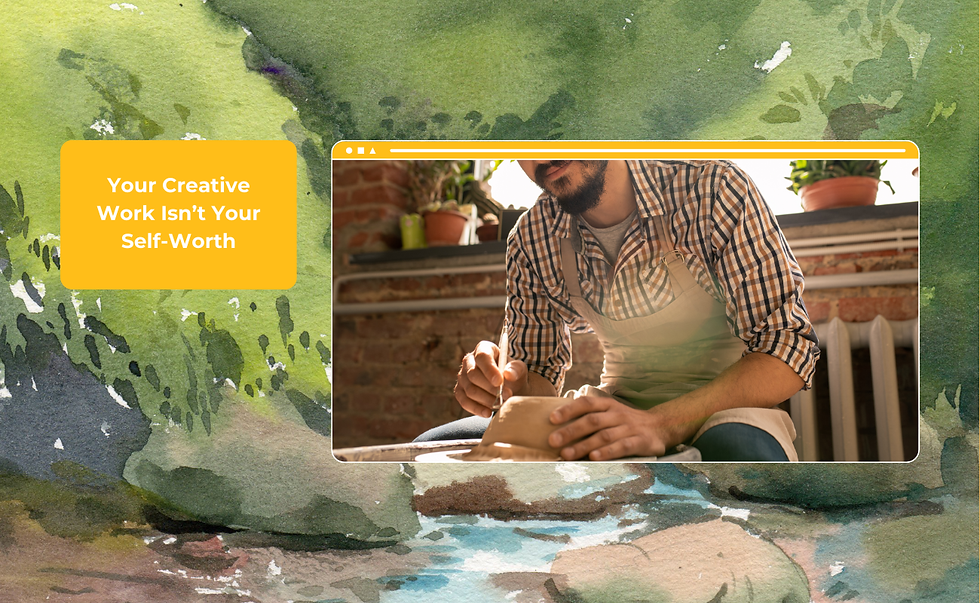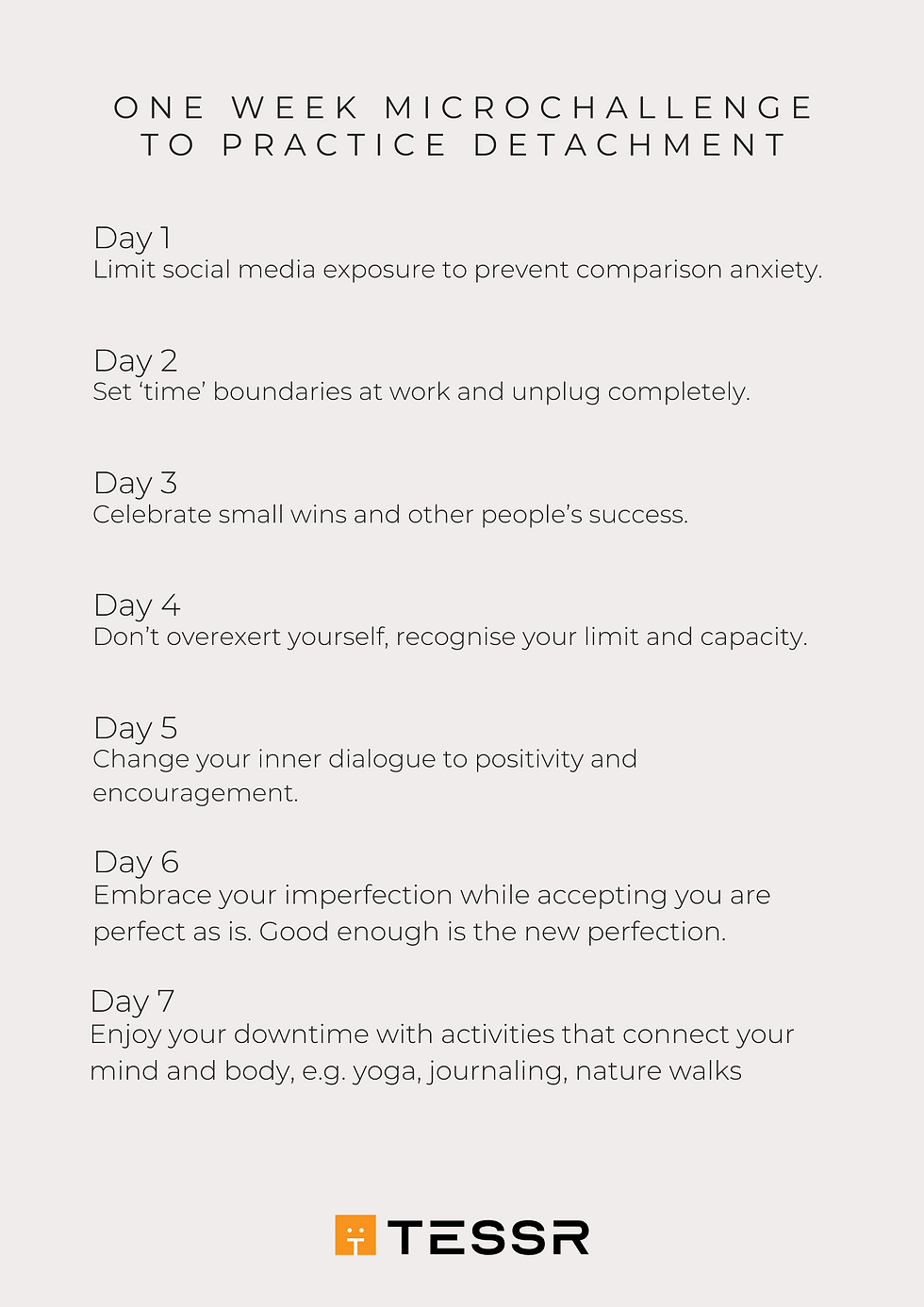A Guide to Detach Your Self-Worth from Your Creative Work
- Adilla

- Sep 12, 2025
- 5 min read
Updated: 2 days ago

When self-expression is your identity, the centre of your work, would your self-worth also be reflected through it? Separating that emotional attachment from creative work can be hard.
How many times have we not heard an artist calling their artwork their child, baby or even a piece of themselves? Then, the accidental ‘habit’ of comparing your creative work with other creatives can harm your self-esteem, too.
Table of Contents
Why Do Creatives Mix Work and Self-Worth?
Think of it this way: as creatives work on their passion, they’re pouring their heart and soul into it, becoming an extension of themselves. Mixing work and self-worth might not be something they do consciously. As much as art builds confidence and self-esteem, it can also do the opposite.
Mental health for creatives tends to be contradictory, but what’s important is finding the balance where your need for worth can still coexist with your acceptance of who you are and what you are now.
It’s Time to Reframe the Mindset
It’s not impossible to detach your self-worth from your work. By shifting your focus to your creative journey rather than the results of your passion, you will change where you place your self-worth. It can also start with something as simple as starting the day with a creative ritual to clear your mind of doubt and insecurities.
So, instead of pushing yourself down when you come across your fellow artists’ artwork, make it a motivation to get better. Let it be a new goal or a benchmark. Your creative journey is a constant work in progress, and there’s nothing wrong with that.
5 Practices to Separate Identity from Outcomes

Acknowledge What You Can’t Control
Take a deep breath and remember that you don’t have to control everything, even the outcomes of your creative work. What will be, will be. Letting go of what is beyond your control will give a sense of peace and a healthy detachment from external circumstances.
Cultivate Your Self-Worth
Prioritise taking care of yourself. Separating your self-worth from external validations can be hard at first, but it gets easier over time, especially if you take part in activities that support healing and personal growth. As typical as this sounds, regularly exercising, journaling down your thoughts to reflect and physical crafts that are unpredictable, but satisfying, are practices that help in detaching self-worth from creative output.
Practise Staying in The Present
Pay attention to your feelings, thoughts, and reactions to anything that you interact with on a day-to-day basis. Analysing these can indirectly separate you from an outcome that you potentially could have been attached to without realising. This moment of pause or awareness with yourself gives you a space for choice of what you should or should not feel in a particular situation.
Align Your Actions with What You Value, Not the Result
Establishing what you value most in your creative journey can distinguish your self-worth from your work. So, rather than focusing on outcomes, what do you want to be through your creative work? The values that you uphold can prevent you from reacting first and taking action that aligns with what you believe in.
Repair Your Inner Dialogue and Embrace What Is True
We are our own worst critics at times. The unkind words that fill your mind will either push you to unrealistic expectations of yourself or paralyse you from further improving your abilities. When you have taken the time to observe your thoughts, are you aware of where these thoughts are coming from? Then, embrace that you are a work in progress and still be good enough where you are now.
How An Improved Creative Workflow Can Help
In a creative team, giving the security that their creative work does not reflect their worth is important too. Project managers can subtly implement ways to build that confidence in them through their project management tools and an improved creative workflow.
Boosts a Sense of Accomplishment
While completing tasks or milestones is already worthy of giving that feeling of completing something, project management tools turn that feeling into a visually and visibly accomplished goal. Notice how in games, it would reward you with minor words of celebration and give you that boost of dopamine?
That can be made possible with project management tools, too. Marking a task as complete and adding it to your list of finished tasks surprisingly boosts your sense of self-worth. This improvement extends beyond just your creative work; it enhances your confidence in your ability to complete tasks in general.
Encourages Focus on Progress Rather Than Results
Project management tools can help to keep track of everything, whether it’s the team’s progress, creative progression or feedback from everyone. So, what does this have to do with helping our creatives with their sense of self-worth? A ‘physical’ proof of their progress is a reminder of how much they have improved; not only will it build up their self-esteem, but it can also challenge their impostor syndrome.
Key Takeaways
As creatives, we put a piece of ourselves in our artwork, so placing your self-worth within it is not your fault.
While practising detachment can be difficult at first, we prepared a one-week micro-challenge for you to start and implement a healthy separation from your work.

Frequently Asked Questions (FAQ)
How does creativity help self-esteem?
When engaging in creative activities, it encourages you to express yourself, take risks and try new things in a safe environment. Hence, building self-esteem over time.
Why does creativity do the opposite, too, bringing down our confidence?
While many factors could contribute to why creativity would also break our confidence as much as it builds, what’s important is that creatives must be mindful as they progress through their creative journey. It may not be a steady uphill journey, but as long as they choose to focus on the positive, it will be alright.
What’s the difference between vanity and self-esteem?
Self-esteem is your internal values that reflect your worth, while vanity is the external appearance and performance likely gained from achievements, not for themselves but for admiration.
Author bio
With a background in Arts English, Adilla has been a casual writer for various hobbies, like parodies of animated shows and plots for board games. She loves to read anything and everything from fantasy stories to articles on tips and tricks. Now an advocate for mental health and effective project management for the creative industry. Currently, Adilla resides in Malaysia and is a creative writer at TESSR. To know more about her, check out her LinkedIn.

Comments